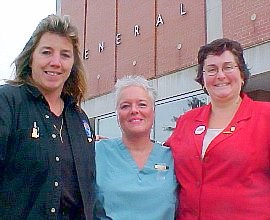Leah Casselman, president of the Ontario Public Service Employees Union, dropped into the Sault today as part of a 20-city tour of hospitals affected by centralized contract negotiations with the Ontario Hospital Association.
Casselman (shown at right with Sue Brown of OPSEU's executive board and Sault phlebotomist Chris Fera) said that low pay and poor working conditions are making it hard for Ontario hospitals to recruit qualified staff.
The problem is especially acute in border towns like Sault Ste. Marie, Casselman said, because staff can easily get better-paying jobs across the border.
"Ontario's hospitals need to pay competitive rates to the people who provide key rehabilitative, diagnostic and therapeutic services," Casselman said.
Talks break off
Bargaining has broken off between the OHA and OPSEU, which represents 5,000 hospital employees including including MRI and CT technologists, mammography technologists, EEG technicians, physiotherapists, occupational therapists, X-ray and lab technologists, social workers, pharmacists, psychologists and respiratory therapists.
Ontario hospitals are short at least 250 laboratory technologists, and experienced staff are being poached by private labs, Casselman said.
"The breakdown of central hospital bargaining will only lead to more chaos in the system as hospitals compete for staff," she said.
Bad faith alleged
Meanwhile, OPSEU has charged the OHA with bargaining in bad faith.
The following is the full text of a news release distributed by the union:
********************************************************************** OHA and four hospitals charged with bad faith bargaining, unfair labour practices
TORONTO - The union representing health professionals in Ontario hospitals has charged the Ontario Hospital Association (OHA) and four hospitals with bargaining in bad faith and unfair labour practices.
The Ontario Public Service Employees Union filed the charges today with the Ontario Labour Relations Board (OLRB).
"The OHA and four hospitals are deliberately undermining the central bargaining process that has helped improve working conditions for thousands of health professionals who are vital to our health care system," said Aimee Axler, chair of the OPSEU Central bargaining team for health professionals.
"They are ignoring an agreement that they themselves signed, and preventing both meaningful bargaining and meaningful arbitration. We’ve had enough. We’re calling on the OLRB to make the OHA and the hospitals honour the agreement."
The OHA bargains on behalf of the 40 hospitals that have opted in to central bargaining.
The four hospitals charged along with the OHA are the University Health Network in Toronto, the Timmins and District Hospital, the Joseph Brant Memorial Hospital in Burlington, and the Northeast Mental Health Centre in Sudbury.
OPSEU’s health professionals include lab technologists, physiotherapists, dietitians, radiation technologists, and workers in scores of related professions.
Since 1975, OPSEU and the OHA have participated in voluntary province-wide bargaining.
Under the agreement covering the current round of negotiations, issues like wages, benefits, vacation, layoff and recall are bargained centrally; issues like scheduling, travel and meal allowances, parking, and uniforms are bargained at the local level.
"The OHA and the four hospitals have refused to participate in central arbitration and have instead attempted to bargain central issues with local committees that, by agreement, have no authority to bargain them," said Axler.
"They want to prevent a central arbitrator from looking at wages and working conditions at hospitals that do not take part in central bargaining, even though the law says the union may table that information."
The current collective agreement expired March 31, 2002. Bargaining towards a new contract began in March 2002 but broke off in June when the parties reached an impasse.
"It’s unfortunate that the OHA and these hospitals have resorted to these desperate measures," said Axler. "Our central team is available and ready to bargain at any time."
